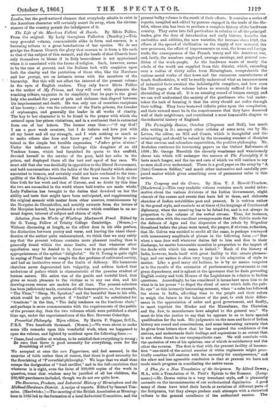The Company and the C?own. By Hon. T. J. Howell-Thurlow.
(Blackwood.)--This very readable volume contains much useful infor- mation about the various divisions of the Indian Government, slight resanas of the causes and events that have led to them, and elaborate sketches of Indian notabilities past and present, It is written rather- in the grand style, and reminds ns at times of the language of Continental diplomacy, when the meaning ha,s to be fished foe, and is not always is proportion to the volume of the verbal stream. Thus, for instance,. in connection with the excellent arrangements that Mr. Colvin made for the defence of Agra and the dispersion of the rebels by Brigadier Groathead before the plans were tested, the peeper, if obvious, reflection, that Mr. Colvin was entitled to credit all the same, is perhaps conveyed{ with unnecessary amplitude of phrase in the following form :—" But when a man does well whatever duties fall to him and dies in their discharge, he merits honourable mention in proportion to the import of the deeds with which his name is linked." Much of the history of India, however, lends itself with great facility to this ornate phraseo- logy, and our author is often very happy in his adaptation of style to- matter. Like a good many old Indians, he is by no means sanguine as to the results of the extension of parliamentary government to our great dependency, and is aghast at the ignorance that he finds pervading English society and both Houses of the Legislature in relation to Indian questions. Accordingly, he has considered it incumbent upon him to de what is in his power " to dispel the cloud of error which dulls the pub- lic eye " at this intensely interesting moment, when " a calm has followed, the storm in India, affording time to the people and their rulers- to weigh the future in the balance of the past, to sink their differ- ences in the appreciation of order and good government, and finally,. to meet together the Hindoo and the Massulman, the Christian and the Jew, to manufacture laws adapted to the general use" We must do him the justice to say that he appears to us to have special qualification for the task. His judgments on the men and facts of Indian. history are sound and conscientious, and some interesting extracts that he gives from letters show that he has acquired the confidence of the natives, and understands their feelings and aspirations to an extent that. is not often found in our unsympathetic race. We will conclude with the quotation of two of hie opinions, one of which is satisfactory and the other the reverse. The first is that with the present facility of locomo.. tion " one-third•of the actual number of white regiments might prac- tically combine hill stations with the necessity for omnipresence," and the ether and less agreeable conclusion is that at present we have not- made much progress in conciliating the native races.






























 Previous page
Previous page